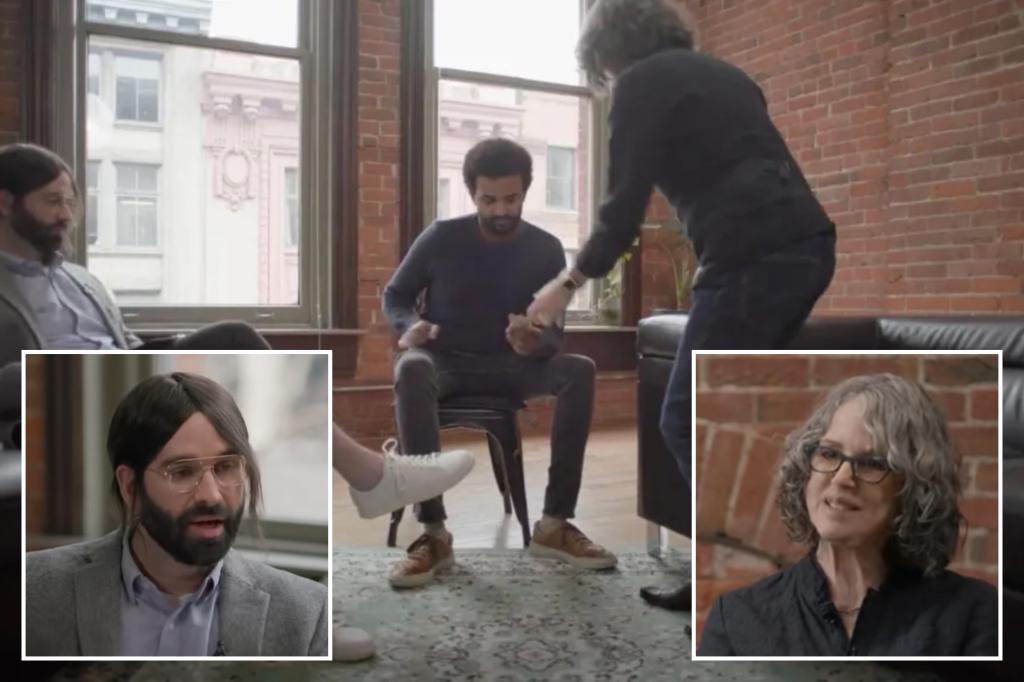
“White Fragility” author Robin DiAngelo was hoodwinked into dipping into her own pocketbook to pay reparations to a black producer in podcaster Matt Walsh’s upcoming documentary “Am I Racist?”
An undercover, man-bun-wearing Walsh, 38, goaded DiAngelo into ponying up cash to his producer named Ben to compensate for the sins of the past by first coughing up the money himself.
Walsh, who had been conducting an interview with DiAngelo for a documentary project while feigning anti-racist sentiments and posing as an activist, summoned Ben after finishing up most of his questions.
“This is Ben, a producer on the film. I thought it would be a powerful opportunity to speak directly to a person of color and confront our racism and also, apologize for the white supremacist systems that oppress Ben,” Walsh began.
DiAngelo, 68, followed suit saying, “On behalf of myself and my fellow white people, I apologize — it is not you, it is us. As long as I’m standing, I will do my best to challenge it.”
Walsh then announced that he’d pay Ben reparations if he’d accept it, prompting his producer to quip, “I mean I won’t turn it down.” Walsh then handed Ben a few bills from his wallet.
“That doesn’t make up for 400 years of oppression, but it’s all that I have to give,” Walsh said.
Taking hold of the new cash padding his wallet, Ben — fully in on the ruse — explained that he doesn’t “know if it’s ever enough” but praised Walsh for “putting in the work” and acknowledged the “small progress I think we made today.”
DiAngelo looked introspective and bewildered as that unfolded.
“That was really weird,” a perplexed and nearly speechless DiAngelo gasped before formulating a response after Walsh asked, “Did you wanna pay any—?”
“I think reparations is like a systemic dynamic and approach,” she added. “I mean I think there may be some people who would be offended by [that].”
Ben explained that he wouldn’t “turn down cash.” A solemn-looking Walsh then stressed the need to allow “ourselves to be uncomfortable.” He underscored, “This is something that I can do right now” and asked, “Why wouldn’t I do it?”
“I can go get some cash for sure,” she relented after struggling to beat back Walsh’s and Ben’s logic. “I don’t mind if that would be something that would be comfortable for you.”
After getting Ben’s blessing, DiAngelo then walked over to her pocketbook, pulled out roughly $30, and told him, “That’s all the cash I have.”
“Thanks,” a smiling Ben replied.
When DiAngelo sat down with Walsh earlier in the documentary, she asked for quick information about who he was, noting that she “has to be careful.”
DiAngelo’s book “White Fragility: Why It’s So Hard for White People to Talk About Racism” hit bookshelves back in 2018 and helped her gain fame as a so-called anti-bias training expert.
The New York Times best-selling tome features some controversial assessments of racism. She claimed that “White people raised in Western society are conditioned into a white supremacist worldview because it is the bedrock of our society and its institutions.”
At another point, she wrote in the book, “People of color may also hold prejudices and discriminate against white people, but they lack the social and institutional power that transforms their prejudice and discrimination into racism; the impact of their prejudice on whites is temporary and contextual.”
Ironically, back in 2021, DiAngelo scored a $12,750 speaking fee at the University of Wisconsin diversity forum, considerably more than the $7,500 paid to its black female keynote speaker, Austin Channing Brown.
More recently, DiAngelo has faced accusations of plagiarizing passages from minority scholars in her doctoral thesis, according to a complaint obtained by the Washington Free Beacon.
The Post reached out to DiAngelo for comment.
Walsh’s documentary is set to hit the silver screen on Sept. 13 and marks the Daily Wire’s first flick to release in movie theaters. The film is intended to function as a deconstruction of the anti-racism movement similar to how his 2022 documentary, “What Is a Woman?” examined gender ideology under a critical lens.
He went undercover and feigned a deep search into his soul to investigate the movement. Wash’s documentary also featured him crashing a high-dollar Race2Dinner, in which he cajoled liberal white women at the table to raise their glasses and toast to “being racist.”


